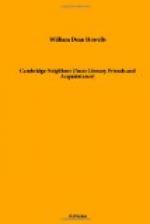Of course no preconception or prepossession of his own was suffered to bar his way to the final truth he was seeking, and he joyously renounced even a conclusion if he found it mistaken. I do not know whether Mrs. Agassiz has put into her interesting life of him, a delightful story which she told me about him. He came to her beaming one day, and demanded, “You know I have always held such and such an opinion about a certain group of fossil fishes?” “Yes, yes!” “Well, I have just been reading------’s new book, and he has shown me that there isn’t the least truth in my theory”; and he burst into a laugh of unalloyed pleasure in relinquishing his error.
I could touch science at Cambridge only on its literary and social side, of course, and my meetings with Agassiz were not many. I recall a dinner at his house to Mr. Bret Harte, when the poet came on from California, and Agassiz approached him over the coffee through their mutual scientific interest in the last meeting of the geological “Society upon the Stanislow.” He quoted to the author some passages from the poem recording the final proceedings of this body, which had particularly pleased him, and I think Mr. Harte was as much amused at finding himself thus in touch with the savant, as Agassiz could ever have been with that delicious poem.
Agassiz lived at one end of Quincy Street, and James almost at the other end, with an interval between them which but poorly typified their difference of temperament. The one was all philosophical and the other all scientific, and yet towards the close of his life, Agassiz may be said to have led that movement towards the new position of science in matters of mystery which is now characteristic of it. He was ancestrally of the Swiss “Brahminical caste,” as so many of his friends in Cambridge were of the Brahminical caste of New England; and perhaps it was the line of ancestral pasteurs which at last drew him back, or on, to the affirmation of an unformulated faith of his own. At any rate, before most other savants would say that they had souls of their own he became, by opening a summer school of science with prayer, nearly as consolatory to the unscientific who wished to believe they had souls, as Mr. John Fiske himself, though Mr. Fiske, as the arch-apostle of Darwinism, had arrived at nearly the same point by such a very different road.




